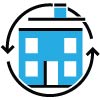If you're a first-time homebuyer, you might be eligible to receive a $15,000 grant through the Federal Home Loan Bank's Home$tart Grant Program to provide down payment or closing cost assistance. To qualify, you must meet grant program requirements, including:
- Financing your home loan through Dupaco
- Meeting household income eligibility limits
- Completing a homebuyer education class
These grants are offered on a limited first-come, first-served basis. A Dupaco mortgage loan officer can help you apply for one during your application process.
Have questions? Need assistance? Contact our Mortgage Lending Department at mortgage@dupaco.com, or give us a call at 800-373-7600, ext. 204.
Buying a house is exciting, expensive and exhausting. This will likely be the most money you’ll ever spend in a single transaction. Whether you’re ready to buy a home now or planning to buy one in the next couple of years, here are a few things you should know.
9 Steps to Homeownership
A down payment is a percentage of your home’s purchase price that you pay up front when you close your home loan. Not only will it affect how much you’ll need to borrow, it can also influence whether your lender will require you to pay for private mortgage insurance (PMI). This typically happens if you put down less than 20% of the home’s purchase price. Also, because your down payment represents your investment in the home, your lender will often offer you a lower rate if you can make a higher down payment.
How much of a down payment you need depends on the purchase price of your home and your loan program. Different loan programs require different percentages, usually ranging from 3% to 20%. Most people finance the majority of their home with a mortgage. Knowing how much you should save for a down payment can be challenging, but there can be several benefits to waiting until you have 20% or more including reduced mortgage payments, lower interest rate, and no mortgage insurance fees (PMI).
Pre-approval for a home loan lets you know how much you can borrow based on your income and existing debt. It also lets sellers know you are a serious buyer and you can comfortably make an offer knowing you won’t have to rush to secure financing.
Almost 80% of all home searches today begin on the internet, but you should also find a good real estate agent to represent you in the search and negotiation process.
When thinking about what home will be best for you, consider things like:
- How long your commute will be
- Quality of the school district
- Accessibility to the types of activities you enjoy
- How much maintenance is required
- How much space you need now and what you’ll need a couple of years from now
- What types of improvement projects you can afford to take on
Make sure you have locked down your financing before you submit an offer! Then, look at comparable property when you make your bid. What did other homes in the neighborhood start off as (“asking price”), and what did they sell at? Remember to add how much you can expect to pay in closing costs.
Make sure final acceptance is predicated on suitable home and radon inspections.
The loan commitment shows that the lender agrees to provide a loan to you, provided certain conditions are met.
Verify that all items you have contracted to buy are there, and items you have not contracted to buy have been removed and that the house has not been damaged in the process.
Be prepared to sign a lot of paperwork. Once everything has closed, the home is yours! Now you can start getting ready to move into your very own home.
Mortgage Learning Center
- Mortgage payment
Principal, interest, insurance and more… We’ll break it all down here. - Rent vs. buy
Compare the costs of renting vs. buying your next home. - Home affordability
Find out how much home you can afford. - Loan term comparison
See how your loan term, interest rate and more impact your overall costs. - Home refinance
Calculate whether it makes sense to refinance your home loan.



